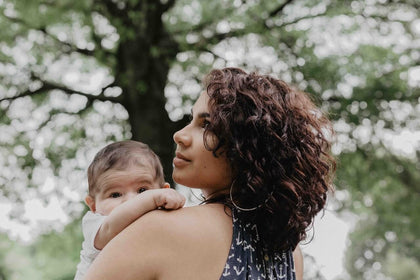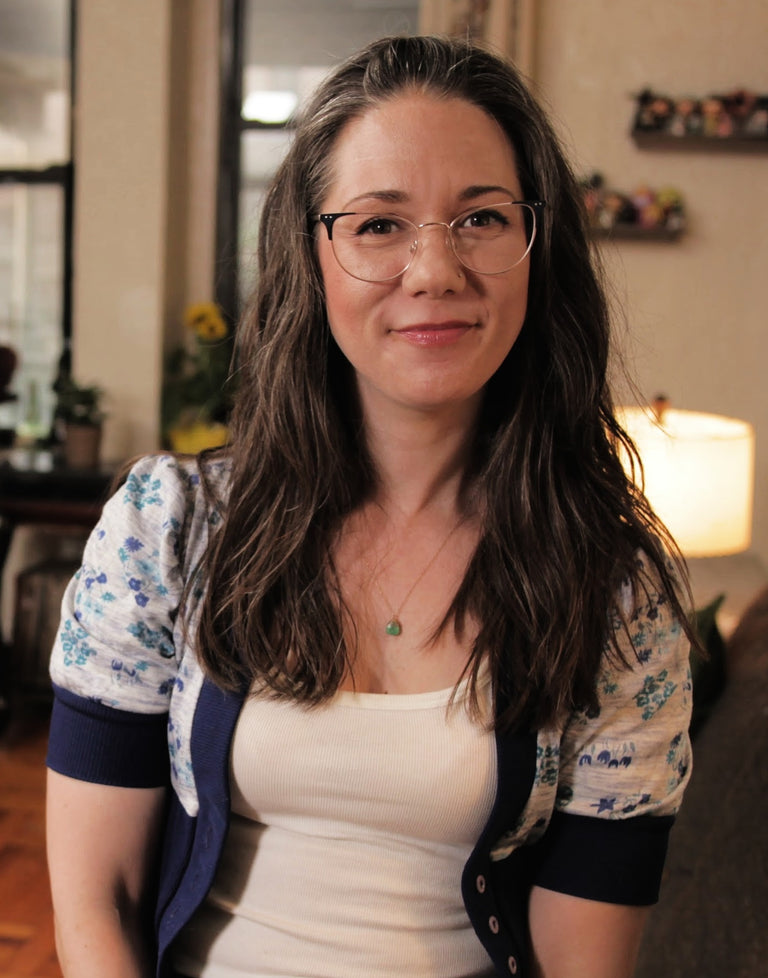Many women experience postpartum hair loss or postpartum alopecia. And while looking down at a shockingly large clump of hair in the shower drain can be downright scary, rest assured that it’s totally normal for new moms to go through a period of excessive hair shedding after giving birth.
“Many new moms see noticeable hair loss a few months after having a baby,” said Dr. Ailynne Marie Vergara-Wijangco, a clinical dermatologist and researcher with Thank Your Skin. “This is normal — and not true hair loss. Dermatologists refer to this condition as excessive hair shedding."
Hopefully, knowing that postpartum hair loss is normal provides some comfort. But if you’re a new mom dealing with shedding hair, you’re probably wondering how long it’s going to last and how much of your hair will be left at the end of it all.
Here's a breakdown of just what to expect with postpartum hair loss, how long it will take to grow your hair, and what you can do to support healthy hair.
#include-related-slider#
So How Long Does Postpartum Hair Loss Really Last?
The postpartum period varies from woman to woman, but generally speaking, it takes about six months postpartum for the body to return to its pre-pregnant physiological state. Hormonal changes continue long after giving birth, and it can take several months for hormone levels to even out.
How does postpartum hair loss fit into this picture?
“The good news is that this excessive shedding is temporary, and you do not have to do anything to remedy it,” explained Dr. Vergara. “Most women see their hair return to its normal fullness by their child’s first birthday. Many women regain normal fullness even earlier.”
Why Does Postpartum Hair Loss Happen?
The female body undergoes a tremendous amount of change during and after pregnancy. Pregnancy hormones might actually help you to grow thicker hair while carrying the baby, and many women report positive changes to their hair during this time.
“Women's bodies experience high estrogen and progesterone levels during pregnancy, which often causes the hair to thicken and become more vibrant,” explained Dr. Zachary Okhah, founder and chief surgeon with PH-1 Miami. “However, following childbirth, these hormones even out, and many mothers experience a significant hair loss or excessive hair shedding due to the hormonal changes. This is your hair beginning to return to its norm."
There isn’t a way to prevent postpartum hair loss because big hormonal shifts are a necessary and natural part of pregnancy and the period following childbirth. While these shifts are completely normal, they impact many aspects of our physiology, including our normal hair cycles.
Postpartum hair loss, simply put, is an interruption to our normal hair growth cycles caused by the hormonal changes brought on by pregnancy and childbirth. “We tend to place postpartum hair loss in the category of telogen effluvium,” said Dr. Erum Ilyas, board-certified dermatologist and founder of AmberNoon. “It is thought to be triggered by major hormonal shifts resulting from pregnancy as well as the physical stress of childbirth."
What Is Telogen Effluvium?
Telogen effluvium, or TE, is a temporary hair loss condition brought on by a major shock or stress to the body. TE can be caused by medical conditions, temporary illness like the flu or COVID-19, or even personal stress like the loss of a loved one or a job. However, in the case of postpartum hair loss, it’s the “shock” your body experiences because of the big shifts in hormones caused by pregnancy and childbirth.
Your hair normally goes through four distinct cycles of growth. The telogen phase is often referred to as “the resting phase” since this is when hair follicles stop producing hair shafts and lay dormant before shedding to begin the growth cycle anew.
Typically about 8%-10% of your follicles are in the resting phase at any given time. But with TE, the shock to your body causes a disproportionate amount of hair follicles to prematurely enter the telogen phase.
In fact, by the time you start to notice excessive hair loss, you’re already on the road to recovery since the shedding is a signal that your hair cycles are shifting back toward the active hair growth cycle or anagen phase.
How Can I Get Back to Healthy Hair Growth?
Hair wellness starts from within and achieving the healthiest hair possible means a holistic approach to your overall health and wellness.
When it comes to a postpartum hair loss treatment plan, it becomes all about taking care of your general health and focusing on your hair care routine.
Focus on Hair-Friendly Foods and Supplements
A balanced and healthy diet is a pillar for general health, and it’s an important part of supporting your body’s return to post-pregnancy balance. Pay attention to nutrients, vitamins and minerals that are especially important to hair growth: biotin, iron, zinc, vitamins C, A and B-9, along with omega-3 fatty acids (to name but a few).
If you’re wondering what foods are “hair-friendly,” think avocados, oatmeal, sweet potatoes, spinach and other leafy greens, mushrooms and lentils to get started. You could also take a daily hair gummy, such as GRO Biotin Gummies, which can cover daily needs for biotin along with folic acid, zinc and vitamins B-5, 6 and 12 and A, C and E — all in a delicious, strawberry-flavored, 100% vegan gummy.
Manage Stress
Since TE is, at its root, caused by a major stressor to the body, it’s important to proactively manage other sources of stress as best you can. And also know that, in time, you should return to your normal head of luscious locks.
“The most important thing women can do to support a return to normal hair growth in a timely manner is to avoid compounding stresses,” advised Dr. Ilyas. “Knowledge is power when it comes to resuming normal hair cycles. The stress of hair loss can always potentially lead to more hair loss.
Dig Deeper: Everything You Should Know About Stress & Hair Loss
Choose the Right Products
Since the hair loss associated with TE and postpartum hair loss tends to be a general thinning all over the head, you might be dealing with less density than you’re used to.
Products that are geared toward fine hair will help prevent your locks from being weighed down and looking lifeless. “To promote your healthy hair growth, nourish your hair with protein by switching to a volumizing shampoo and avoiding intensive conditioners — these will only weigh down your hair,” said Dr. Okhah.
VEGAMOUR's GRO Revitalizing Shampoo, which features a fresh bergamot scent, offers gentle yet effective cleansing with the added bonus of our proprietary vegan silk protein Karmatin™ and a formulation that promotes thicker, fuller-looking hair.
Other tools to consider adding to your volumizing toolkit could include a great-smelling dry shampoo to help add lift to your roots.
Revisit Your Hair Care Routine
Healthy hair starts with a healthy scalp, so be gentle! Avoid blow dryers and heat styling as much as possible. Tight ponytails or buns are a no-no — same with excessive brushing and combing. Support your scalp’s natural microbiome with a regular detoxifying treatment, and give your body’s efforts to return to normal hair growth cycles a boost with a daily hair serum. Vegan and cruelty-free GRO Hair Serum is fortified with powerful phyto-actives. It:
- Reduces signs of shedding by up to 85%*
- Increases the appearance of hair density by up to 56%*
*Based on a 120-day independent, third-party clinical study with 40 participants using GRO Hair Serum once daily.
Exercise Regularly
As the saying goes: healthy body, healthy mind — and we’d like to add — healthy hair! Exercise has so many benefits for our health, including managing stress and helping to balance hormone levels, both of which are major contributors to postpartum hair loss. Regular exercise also helps maintain a healthy weight, reduce the risk of heart diseases, manage blood sugar and insulin levels and stimulate blood flow.
More: Why Exercise Should Be Part Of Your Hair Care Routine
When to See a Health Care Provider
Hair loss is complex and can have many causes, so if you’re worried that your postpartum loss is excessive or lasting longer than it should, see a doctor.
“If your hair does not regain its normal fullness after one year, you may want to see a dermatologist," advised Dr. Vergara. "Something else may be causing your hair to fall out. People lose hair for many reasons, and an accurate diagnosis is essential for effective treatment.”
Also: What to Do If You're Losing Eyelashes Postpartum
The Takeaway
Hair loss after childbirth is totally normal. While new moms might be startled by the sudden and seemingly drastic shedding that comes along with postpartum hair loss, it is typically a short-lived experience that resolves on its own. However, if the hair loss persists or becomes more pronounced, see your healthcare provider.
While there is no way to stop postpartum hair loss, you can support new growth by managing stress, eating well, adding supplements and taking care of your scalp with the proper hair care routine. Here's to your hair's health!
#include-related-slider#
More From VEGAMOUR
- Shop: Shea Whitney's Favorite VEGAMOUR Products
- 10 Vitamin Deficiencies That Can Cause Hair Loss
- 6 Tips for Styling Thin Hair
- Side Effects of Spironolactone Explained
Photo credit: Bethany Beck/Unsplash
Back



















